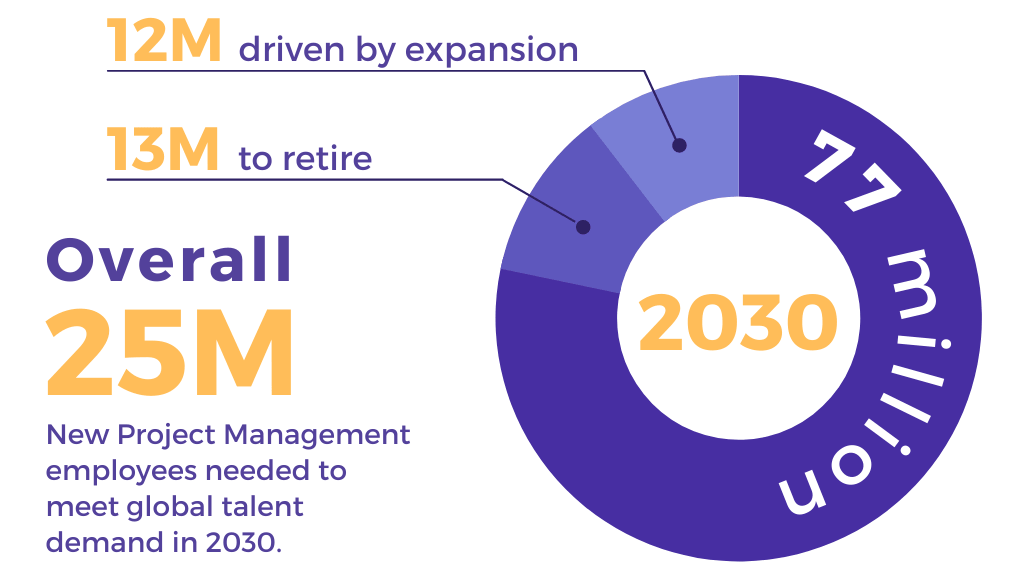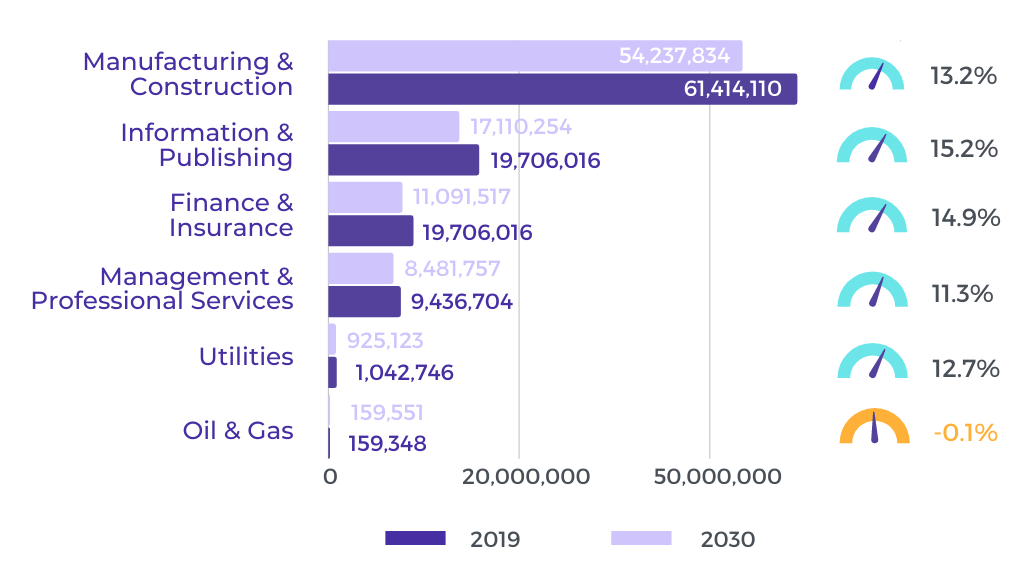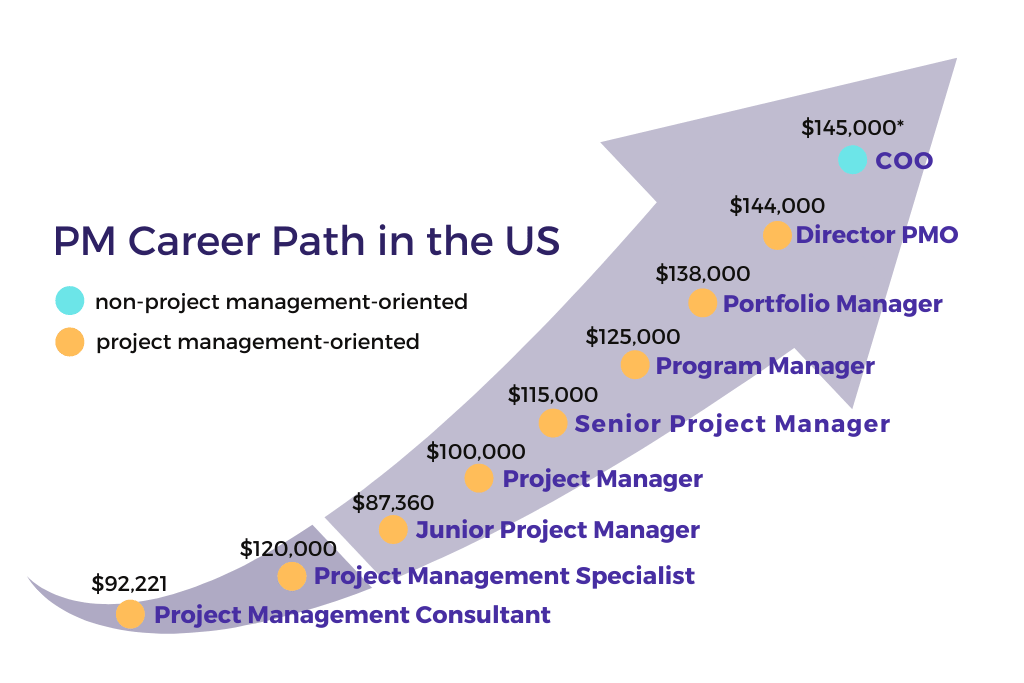
Project Management Career Path
Demand for Project Managers is High
Project management-oriented employees (PMOE) are holding one of the following 8 positions.
- Director of PM/PMO
- Portfolio Manager
- Program Manager
- Senior Project Manager
- Project Manager
- Junior Project Manager
- Project Management Specialist
- Project management Consultant
According to 2021 Talent Gap Report presented by Project Management Institute (PMI) the global economy needs 25M new project professionals by 2030.
There is a widespread misconception (especially among people who are just starting to look into career opportunities in project management) that project management is practiced particularly in the IT sector.
Project management has an important role in the IT sector, yet it is applicable and widely practiced in all industries.
Demand for project managers and project management-oriented jobs is associated with the following reasons:
- An increase in the number of jobs requiring project management oriented skills.
- Higher demand for project professionals in emerging and developing countries due to economic growth.
- The rate of retirement from the workforce. It is estimated that by 2030 more than 13M project management employees will retire.
The Best Industries for Project Management
Many industries have a growing need for project management-oriented professionals, and you can use this to your advantage if you are planning to start a career in one of those sectors.
According to PMI’s 2021 Talent Gap Report, the following industries employ the highest number of project management-oriented talents.
- Manufacturing & Construction
- Information & Publishing
- Finance & Insurance
- Management & Professional Services
- Utilities
- Oil & GAs
It is estimated that the need for project management-oriented employees will increase in all sectors, except Oil and Gas, where 0.1% decrease is projected.
Manufacturing & Construction sector employs the highest number of project management-oriented professionals – more than 54.2M. By 2030, this number will increase by 13.2%. More than half of total project management-oriented workers are in this sector, and it will still be the case in 2030.
Information & Publishing sector is expected to record the highest percentage change by 2030, 15.2%. However, by the actual number of project management-oriented employees, this sector succumbs to the Manufacturing & Construction sector, which will continue to be the leader in 2030 with more than 61M project management-oriented employees in 2030.
Finance & Insurance, Management & Professional Services, and Utilities sectors will have 14.9%, 11.3%, and 12.7% increase respectively. Yet, the combined number of project management-oriented employees in these 3 sectors (2,506,962) will still be less than that in the Information & Publishing sector only(2,595,762).
Oil & Gas is the only sector where a decrease in the number of project management-oriented employees is projected.
Salaries in Project Management
Source: Project Management Institute
Salaries in project management vary from country to country. Project professionals get paid differently depending on the industries they are in, their years of experience, certifications, project size, and many other factors.
The 11th edition of PMI’s Earning Power: Project Management Salary Survey provides comprehensive information about project manager’s yearly salaries in 42 countries across several variables.
According to this survey the top five countries where project professionals have the highest median salaries are:
- Switzerland: $132,086
- United States: $116,000
- Australia: $101,381
- Germany: $96,987
- Netherlands: $93,839
Project professionals’ median annual salaries increase along with the yeast of experience in project management. Project professionals with more than 20 years of experience earn on average about two times more than those with 0 to 3 years of experience.
However, there is a significant variation among the countries. Columbia, for example, accounts for the highest increase, 275%, and Japan – the lowest, 33%. In the United States, the increase is 63%.
Salaries in project management increase along with added responsibilities and the rate of increase varies significantly from country to country. According to the 11th edition of PMI’s Earning Power: Project Management Salary Survey the most dramatic increase is seen in the Philippines.
In Switzerland project management-oriented employees earn the highest median salaries in all positions. The US is in second place.
Why Do Companies Need to Hire You?
In recent years, most companies are responding to technological challenges and customer needs by introducing transformational and strategic products and services. These initiatives are usually implemented through projects.
Not all the projects are completed successfully – within the scope, budget, and time while meeting business expectations. According to PMI’s 9th Global Project Management Survey conducted in 2017
- 14% of projects were deemed failures,
- 43% failed to finish within their initial budgets,
- 49% failed to finish within their initially scheduled times.
To mitigate issues leading to project failures, decision makers are creating more project management career options in their companies. This attracts new qualified talents who will lend a helping hand to improve the project success rate.
How to Become a Project Manager?
We have highlighted 6 most important skills that every project manager should have.
Soft skills
- Communication skills – as a project manager, you will spend a significant amount of time communicating information flow between stakeholders; therefore, being a good communicator is a must.
- Leadership skills – project managers should build an inspiring vision and ensure that every member of the team is motivated to carry out his or her part in the project successfully.
- Time management – as part of their role, project managers need to ensure that the project does not go beyond its defined deadlines since it will affect the project success in a negative way, which may even result in failure.
Technical skills
- Planning – as a project manager, you should be able to properly plan project timeline and resources. This can be challenging since in the initiation phase most of the activities are uncertain and require detailed forecasting.
- Risk management – risks are inherent parts of all projects. It is the responsibility of project managers to effectively manage and mitigate risks by adopting sound risk management processes.
- Budgeting – all projects are constrained by budget, so tight control of the project costs is one of the key priorities of project managers.
Path to Project Management Degree/Certification
In its Pulse of Profession Survey PMI claims that 93% of organizations use standardized project management practices. So, if you are considering a career in project management you should have a certification that helps you navigate these practices.
The good news is that you can start your career in project management regardless of your background. There is no formal path in a project management career.





